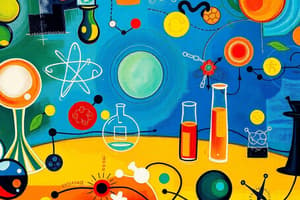Podcast
Questions and Answers
What is the first step of the scientific method?
What is the first step of the scientific method?
- Do background research
- Draw conclusions
- Test your hypothesis by doing experiments
- Ask a question (correct)
Which step involves formulating a possible explanation for the problem or curiosity?
Which step involves formulating a possible explanation for the problem or curiosity?
- Do background research
- Construct a hypothesis (correct)
- Test your hypothesis by doing experiments
- Analyze the data
When should a scientist share their conclusions with the scientific community?
When should a scientist share their conclusions with the scientific community?
- Before asking a question
- After drawing conclusions (correct)
- While testing the hypothesis by doing experiments
- After analyzing the data
What is the purpose of 'Do background research' in the scientific method?
What is the purpose of 'Do background research' in the scientific method?
What is the main aim of the scientific method?
What is the main aim of the scientific method?
Which branch of science studies human behavior and society?
Which branch of science studies human behavior and society?
What are the disciplines included in the natural sciences?
What are the disciplines included in the natural sciences?
Which branch of science involves the use of logic, mathematics, and statistics to develop abstract models and theories?
Which branch of science involves the use of logic, mathematics, and statistics to develop abstract models and theories?
What is the main focus of social sciences?
What is the main focus of social sciences?
What role does science play in our daily lives?
What role does science play in our daily lives?
What is the primary focus of life sciences?
What is the primary focus of life sciences?
How does science contribute to economic growth?
How does science contribute to economic growth?
What is one of the reasons why science is important for understanding the natural world?
What is one of the reasons why science is important for understanding the natural world?
Which branch of science is concerned with the study of the Earth and its environment?
Which branch of science is concerned with the study of the Earth and its environment?
What is the significance of technological advancements driven by science?
What is the significance of technological advancements driven by science?
What is the purpose of the 'Observation' step in the scientific method?
What is the purpose of the 'Observation' step in the scientific method?
What is the main focus of the 'Physical Sciences' branch of science?
What is the main focus of the 'Physical Sciences' branch of science?
What differentiates science from just a collection of facts?
What differentiates science from just a collection of facts?
When should a scientist share their conclusions with the scientific community?
When should a scientist share their conclusions with the scientific community?
What does the 'Branches of Science' section emphasize?
What does the 'Branches of Science' section emphasize?
Flashcards are hidden until you start studying
Study Notes
Introduction
Science is a systematic and logical way of studying the physical, biological, and social aspects of the world around us. It involves making observations, asking questions, and formulating explanations for natural phenomena. The scientific method is a process used to develop and test scientific knowledge, and it is based on evidence-based inquiry and the scientific community's collective understanding.
The Scientific Method
The scientific method is a set of procedures that scientists use to minimize errors and biases in their research. It consists of the following steps:
- Ask a question: Identify a problem or curiosity that needs to be addressed.
- Do background research: Gather information about the topic from various sources.
- Construct a hypothesis: Formulate a possible explanation for the problem or curiosity.
- Test your hypothesis by doing experiments: Design and carry out experiments to gather evidence for or against your hypothesis.
- Analyze the data: Interpret the results of the experiments and determine whether they support or contradict your hypothesis.
- Draw conclusions: Based on the analysis of the data, draw conclusions about the hypothesis and the problem or curiosity.
- Report your results: Share your conclusions with the scientific community through publications or presentations.
Branches of Science
Science can be broadly categorized into three main branches: natural sciences, social sciences, and formal sciences.
Natural Sciences
Natural sciences study the physical and biological aspects of the world. The natural sciences include biology, chemistry, physics, astronomy, geology, and Earth sciences. These disciplines aim to understand the natural phenomena and processes that shape our world.
Social Sciences
Social sciences study human behavior and society, focusing on human relationships, cultures, and institutions. The social sciences include psychology, sociology, anthropology, economics, political science, and geography. These disciplines help us understand how people interact with each other and the world around them.
Formal Sciences
Formal sciences involve the use of logic, mathematics, and statistics to develop abstract models and theories. These disciplines include mathematics, logic, and statistics. Formal sciences are essential for understanding and explaining the natural and social sciences.
The Importance of Science
Science plays a crucial role in our daily lives, from understanding the workings of our bodies to developing new technologies. It helps us make informed decisions, improves our quality of life, and drives economic growth. Science also contributes to a better understanding of the world and our place in it, fostering curiosity and innovation.
Conclusion
Science is a fundamental aspect of our lives, providing us with knowledge and understanding about the world. The scientific method, a systematic process for developing and testing scientific knowledge, is essential for advancing our understanding of the natural, social, and formal aspects of the world. By learning about science and its branches, we can appreciate the importance of scientific inquiry in our daily lives and the world around us.
Studying That Suits You
Use AI to generate personalized quizzes and flashcards to suit your learning preferences.



